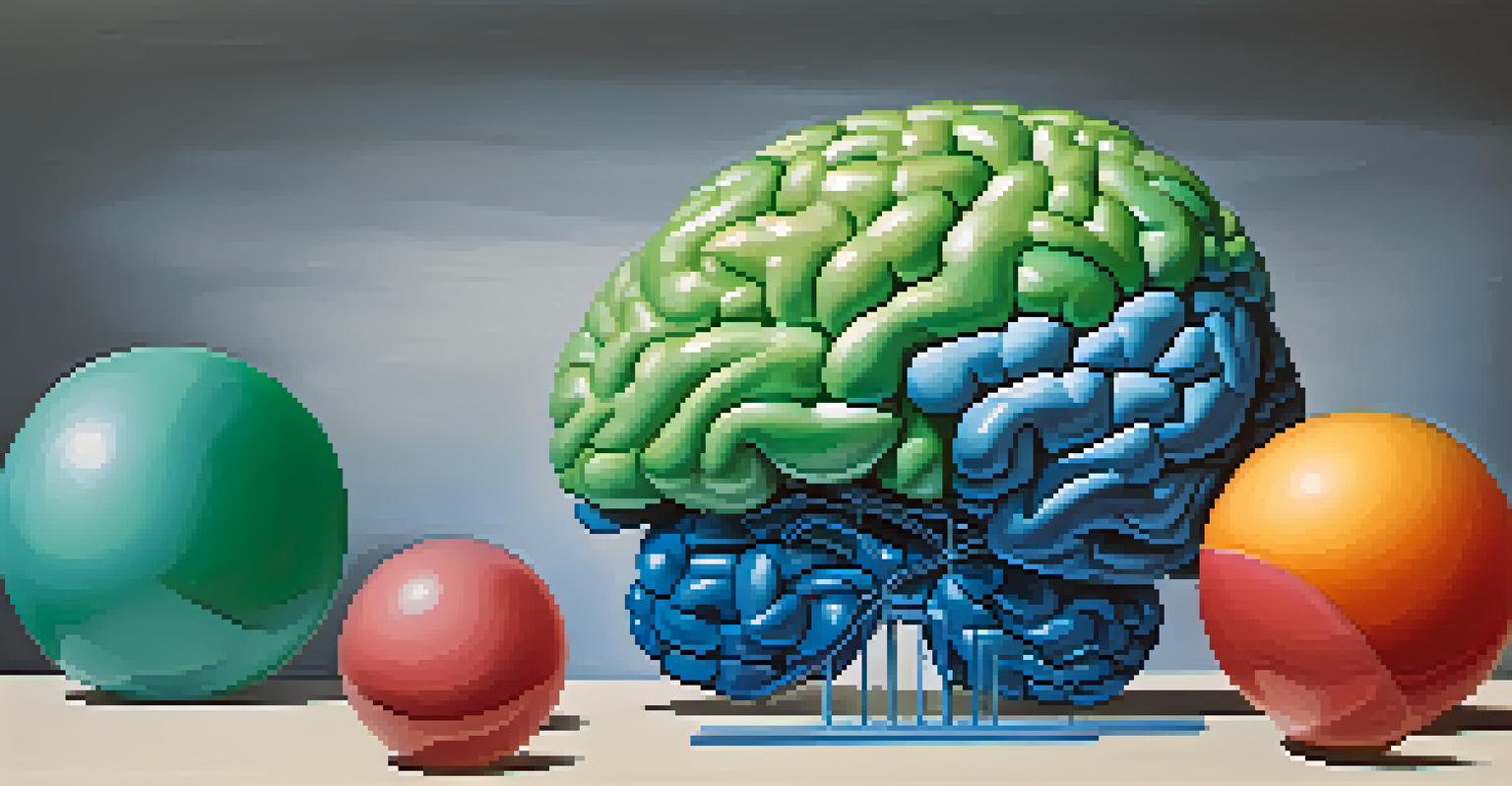The Role of Prior Knowledge in Cognitive Load Management

What is Cognitive Load and Why It Matters
Cognitive load refers to the amount of mental effort being used in the working memory. It's a crucial concept in educational psychology that helps us understand how people learn. When cognitive load is too high, learning can become ineffective, leading to frustration and disengagement.
We learn by example and by direct experience because there are real limits to the adequacy of verbal instruction.
Imagine trying to juggle multiple balls at once. If you add too many balls, you drop them all. Similarly, when learners are overwhelmed with information, they find it hard to absorb new concepts. Understanding cognitive load helps educators design better learning experiences that maximize retention.
By managing cognitive load effectively, we can enhance learning outcomes. This involves balancing the intrinsic load (the complexity of the material) with the extraneous load (the distractions in the environment) and the germane load (the effort dedicated to processing information). Prior knowledge plays a significant role in this balance.
The Importance of Prior Knowledge in Learning
Prior knowledge is the information and experiences that learners already possess before encountering new material. It serves as a foundation upon which new knowledge can be built. Think of it as the scaffolding that supports a building; without it, the structure might collapse.

When learners can relate new information to what they already know, they are more likely to retain that information. For instance, if a student already understands basic math concepts, introducing algebra becomes easier and less cognitively taxing. This connection between old and new knowledge reduces the cognitive load.
Cognitive Load Impacts Learning
High cognitive load can hinder learning effectiveness, making it essential for educators to balance the complexity of material and environmental distractions.
Moreover, prior knowledge not only aids in comprehension but also fosters critical thinking. It allows learners to make inferences and draw conclusions based on their existing understanding, making the learning process more efficient and meaningful.
How Prior Knowledge Reduces Cognitive Load
When learners have strong prior knowledge, they can integrate new information more easily, which reduces the cognitive load. By connecting new ideas to familiar concepts, learners can process information without feeling overwhelmed. This integration is akin to adding a new piece to a puzzle; it becomes clearer when you already have the border in place.
Knowledge is not a destination, but a journey; what you know is only the beginning of what you can learn.
Additionally, having prior knowledge enables learners to identify what is essential to focus on and what can be ignored, thereby alleviating unnecessary cognitive strain. For instance, a student familiar with historical events can quickly grasp the significance of a new event without getting bogged down by details.
This efficiency not only enhances understanding but also boosts confidence. When learners feel capable of tackling new challenges, they are more likely to engage deeply, further reducing cognitive load and creating a positive feedback loop in their learning journey.
Challenges of Prior Knowledge: Misconceptions
While prior knowledge is beneficial, it can also present challenges, particularly when misconceptions are involved. If learners bring incorrect prior knowledge to a new topic, it can hinder their ability to learn effectively. Imagine trying to navigate with a faulty map; you might end up lost rather than finding your way.
Misconceptions can create barriers to understanding, leading to increased cognitive load as learners struggle to reconcile new information with their incorrect beliefs. Educators must be aware of these potential pitfalls and address them to facilitate better learning.
Prior Knowledge Enhances Retention
Leveraging prior knowledge helps learners connect new information to what they already know, reducing cognitive load and improving retention.
To overcome misconceptions, educators can use strategies such as diagnostic assessments to identify and correct misunderstandings. This proactive approach ensures that learners start with a solid foundation, reducing cognitive load and enhancing the learning experience.
Strategies for Leveraging Prior Knowledge
To optimize cognitive load management, educators can employ specific strategies to leverage prior knowledge. One effective approach is to activate prior knowledge before introducing new material. Techniques like brainstorming or discussions can help learners recall what they already know, setting the stage for new learning.
Another strategy involves scaffolding instruction, where educators build on learners' existing knowledge through gradually increasing complexity. For example, introducing concepts step-by-step helps learners assimilate information without feeling overwhelmed, much like climbing a staircase rather than attempting to leap to the top.
Finally, providing relatable examples can bridge the gap between prior knowledge and new concepts. By drawing connections to real-life situations or familiar contexts, educators can enhance understanding and retention, making the learning process smoother and more effective.
The Role of Feedback in Cognitive Load Management
Feedback plays a crucial role in helping learners manage cognitive load effectively. Constructive feedback allows learners to understand their progress and areas needing improvement, which can help reduce anxiety and cognitive strain. When learners know what to focus on, they can direct their cognitive resources more efficiently.
Moreover, timely feedback reinforces the connection between prior knowledge and new learning. For instance, when a student receives feedback on a math problem, it can clarify any misconceptions and strengthen their understanding, making future learning less taxing.
Misconceptions Can Hinder Learning
Incorrect prior knowledge can create barriers to understanding, increasing cognitive load and making it crucial for educators to address these misconceptions.
Encouraging a culture of open dialogue where learners feel comfortable asking questions also contributes to effective cognitive load management. This environment fosters curiosity and exploration, allowing learners to navigate their cognitive landscape with confidence.
Conclusion: Embracing Prior Knowledge for Effective Learning
In summary, prior knowledge is a powerful tool in cognitive load management. By understanding its role, educators can create learning experiences that are engaging and effective. Recognizing what learners already know allows for more tailored instruction, making the learning process smoother and more meaningful.
As we explore the intricacies of how prior knowledge interacts with cognitive load, it becomes clear that effective learning is not just about delivering information but about connecting with learners on a deeper level. This connection is essential for fostering understanding and retention.

Ultimately, by embracing prior knowledge, educators can empower learners to take charge of their learning journeys, reducing cognitive load and enhancing overall educational experiences.